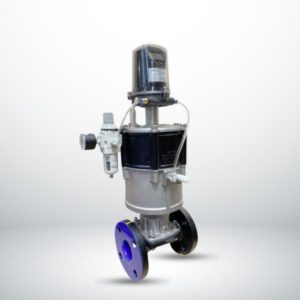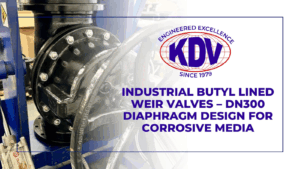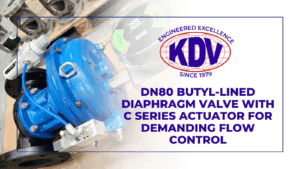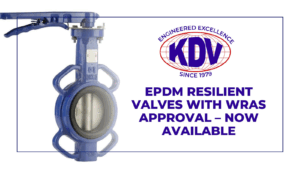DN200 CF8M WT Diaphragm Valves for a Fertiliser Plant in the UK
Two DN200 CF8M Weir Type Diaphragm Valves are in the final stages of production at KDV Flow’s Yorkshire facility. These robust valves, renowned for their precision flow control and durability, are destined for a local fertiliser plant, demonstrating our commitment to supporting the regional manufacturing community.
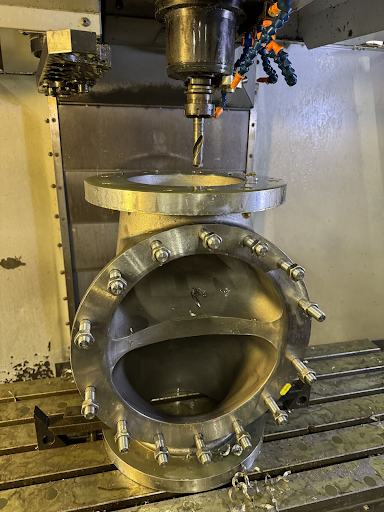
Key Features of Our DN200 Weir Type Diaphragm Valves:
- CF8M (316 Stainless Steel) Body: Provides excellent corrosion resistance, essential for the harsh chemicals used in fertilizer production. Its superior durability ensures extended service life, reducing maintenance costs and downtime.
- Weir Type Design: This innovative design ensures smooth flow, minimizes turbulence, and reduces pressure drop, optimizing efficiency and reducing energy consumption. The weir configuration also enhances sealing capability, preventing leakage and ensuring precise flow control.
- DN200 Size: This large bore size is ideal for handling the high flow rates common in fertilizer plant processes. It accommodates bulk fluid transfer while maintaining consistent pressure levels, making it a preferred choice in large-scale operations.
- ANSI 150 Drilling: Ensures compatibility with standard piping systems and flanges. This universal standard simplifies installation and integration with existing infrastructure, reducing commissioning time.
A Wide Range of Valve Solutions
While these Weir Type Diaphragm Valves are specifically designed for fertiliser applications, KDV Flow offers a comprehensive range of valve solutions to cater to diverse industries. Our portfolio includes various materials and configurations, including PTFE and rubber lined valves, to meet specific process requirements. These materials enhance chemical resistance, making them ideal for aggressive and high-purity applications, such as pharmaceutical and water treatment industries.
Frequently Asked Questions (FAQs)
1. How does the CF8M (316 Stainless Steel) body of a DN200 Weir Type diaphragm valve enhance its performance in corrosive environments?
The CF8M (316 Stainless Steel) construction provides superior resistance to a wide range of corrosive media, including acids, alkalis, and chlorides, making it ideal for aggressive chemical applications. It also ensures long-term durability and reduces the risk of pitting and crevice corrosion, extending the valve’s operational lifespan in harsh industrial conditions.
2. What are the key advantages of using a DN200 Weir Type diaphragm valve in high-flow applications?
The DN200 size is designed for high-flow operations, allowing efficient fluid transfer with minimal pressure drop. The weir-type design enhances flow control precision while maintaining reliable sealing, which is essential for handling large volumes of liquids or slurries in industries like fertilizer production, water treatment, and chemical processing.
3. What factors should be considered when selecting an actuator for a DN200 CF8M Weir Type diaphragm valve in an automated system?
When automating a DN200 Weir Type diaphragm valve, key factors include operating pressure, flow control accuracy, fail-safe requirements, and environmental conditions. Pneumatic actuators are preferred for fast and consistent operation, while electric actuators provide precise modulation. Additionally, compatibility with control systems (such as PLCs or SCADA) is crucial for seamless integration into industrial automation networks.
4. How does the ANSI 150 drilling specification impact the installation and compatibility of DN200 Weir Type diaphragm valves?
The ANSI 150 flange drilling ensures that the valve can be easily integrated into standard piping systems without requiring custom modifications. This specification allows seamless replacement or retrofitting in existing process lines, simplifying maintenance and reducing installation downtime.
5. What are the typical maintenance requirements for a DN200 CF8M Weir Type diaphragm valve in continuous operation?
Regular diaphragm inspection and replacement is essential to prevent leaks and maintain efficient operation. Additionally, periodic checks on the actuator (if automated), cleaning of valve internals to prevent buildup, and ensuring proper torque settings on flange bolts can extend the valve’s service life. In high-temperature or aggressive chemical applications, selecting the right diaphragm material (such as PTFE or EPDM) can further optimize performance and longevity
Supporting Local Industry
We’re excited to see these Yorkshire-made valves heading to a local customer, contributing to the growth and success of the region’s fertilizer industry. KDV Flow remains committed to providing top-quality valves and exceptional service to businesses throughout Yorkshire and beyond.


